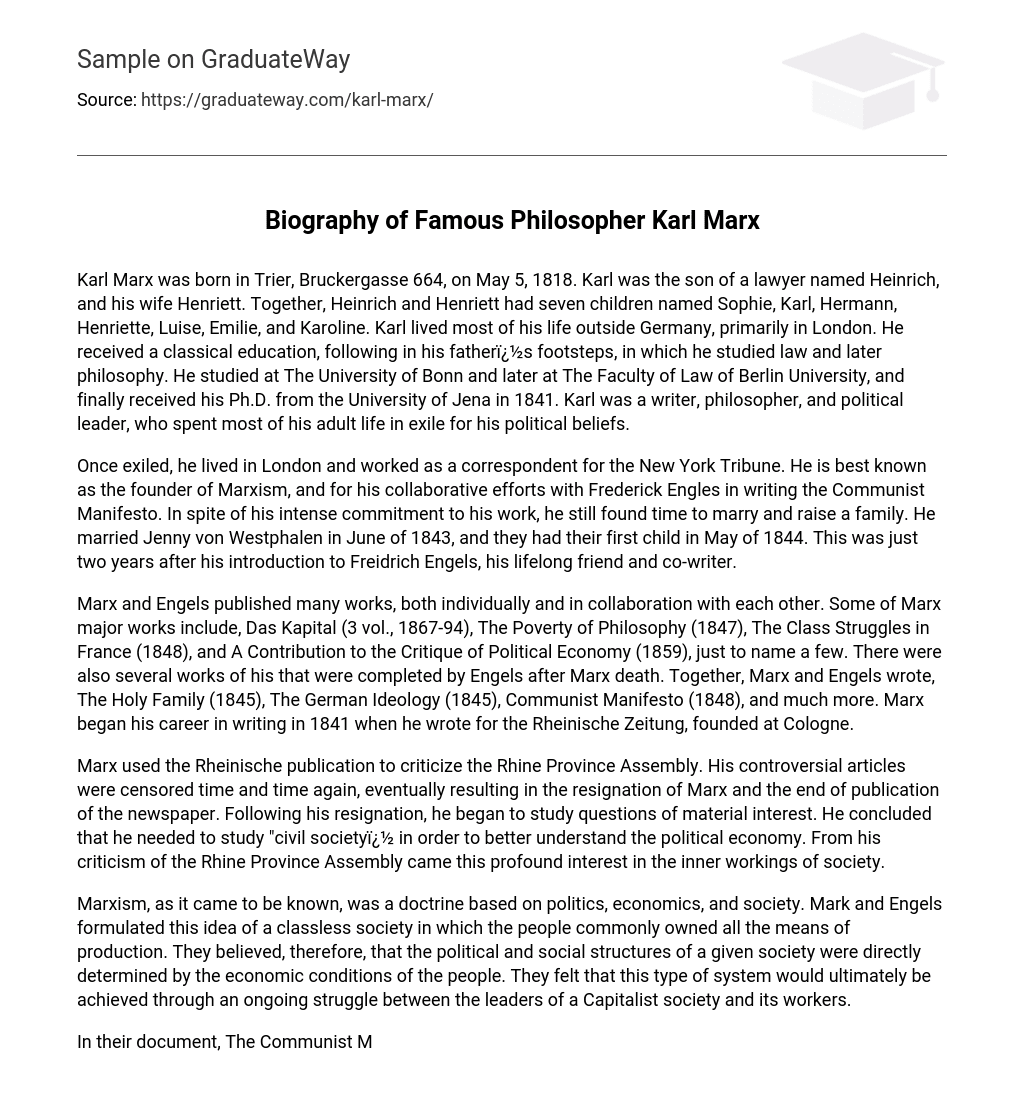Karl Marx was born in Trier, Bruckergasse 664, on May 5, 1818. Karl was the son of a lawyer named Heinrich, and his wife Henriett. Together, Heinrich and Henriett had seven children named Sophie, Karl, Hermann, Henriette, Luise, Emilie, and Karoline. Karl lived most of his life outside Germany, primarily in London. He received a classical education, following in his father�s footsteps, in which he studied law and later philosophy. He studied at The University of Bonn and later at The Faculty of Law of Berlin University, and finally received his Ph.D. from the University of Jena in 1841. Karl was a writer, philosopher, and political leader, who spent most of his adult life in exile for his political beliefs.
Once exiled, he lived in London and worked as a correspondent for the New York Tribune. He is best known as the founder of Marxism, and for his collaborative efforts with Frederick Engles in writing the Communist Manifesto. In spite of his intense commitment to his work, he still found time to marry and raise a family. He married Jenny von Westphalen in June of 1843, and they had their first child in May of 1844. This was just two years after his introduction to Freidrich Engels, his lifelong friend and co-writer.
Marx and Engels published many works, both individually and in collaboration with each other. Some of Marx major works include, Das Kapital (3 vol., 1867-94), The Poverty of Philosophy (1847), The Class Struggles in France (1848), and A Contribution to the Critique of Political Economy (1859), just to name a few. There were also several works of his that were completed by Engels after Marx death. Together, Marx and Engels wrote, The Holy Family (1845), The German Ideology (1845), Communist Manifesto (1848), and much more. Marx began his career in writing in 1841 when he wrote for the Rheinische Zeitung, founded at Cologne.
Marx used the Rheinische publication to criticize the Rhine Province Assembly. His controversial articles were censored time and time again, eventually resulting in the resignation of Marx and the end of publication of the newspaper. Following his resignation, he began to study questions of material interest. He concluded that he needed to study “civil society� in order to better understand the political economy. From his criticism of the Rhine Province Assembly came this profound interest in the inner workings of society.
Marxism, as it came to be known, was a doctrine based on politics, economics, and society. Mark and Engels formulated this idea of a classless society in which the people commonly owned all the means of production. They believed, therefore, that the political and social structures of a given society were directly determined by the economic conditions of the people. They felt that this type of system would ultimately be achieved through an ongoing struggle between the leaders of a Capitalist society and its workers.
In their document, The Communist Manifesto, Marx and Engels outline the principles of communism and declared openly the Communists views and goals for their society. This manifesto was written for the London Congress of the Communist League, and approved by the Central Authority of the Communist League in January 1848. Even today, the Manifesto is still regarded as “one of the world�s greatest political documents in content, style, and influence. The overall theme of the Communist Manifesto could be summed up in the last line of the Manifesto, “Workers of the world, unite.”
The work that Karl Marx did is very closely related to what we are studying in this class. Our main focus is on how the media effects society. Marx is a classic example of how one man�s published thoughts and ideas can not only point out the strengths and weaknesses in a society, but also help to shape that society. In 1864, Marx and Engels even helped found the International Workingman�s Association. I personally feel that he had a great insight as to how society could be improved. His idea of the workers being free from economic exploitation is one that I think appeals to almost any one who has ever had to work for minimal wages, and/or compensation.
A modern parallel to his work can be seen in the American Stock Exchange. As a company�s income increases or decreases, so does the income (from profit shares) of its employee shareholders. However, the obvious difference between this example and Marxism is that the stock market does not represent a “classless society.” Nevertheless, it does show some parallel to Marx�s� view of common ownership of the means of production. A common thread that I see in Marxism and our society today is the need for improved living and working conditions for society as a whole. Today, as in Marx�s time, the struggle still continues to find a better way to live our lives.





